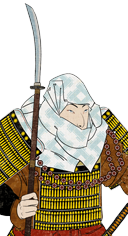
Basic Unit Statistics (can be modified by difficulty level, arts, skills, traits and retainers)
| Recruitment Cost | 600 | |
| Upkeep Cost | 150 | |
| Melee Attack | 10 | 28% |
| Charge Bonus | 12 | 24% |
| Bonus vs Cavalry | 15 | 50% |
| Melee Defence | 8 | 22% |
| Armour | 4 | 26% |
| Morale | 12 | 24% |
Strengths & Weaknesses
- Versatile infantry, good against cavalry and other infantry.
- Weak armour makes them vulnerable to arrows.
- Not as strong as more specialised anti-infantry and anti-cavalry units.
Abilities
- Warcry - Warcry heavily demoralises up to four nearby enemy units, slowing them down and affecting their defence ability for a short time.
Requires
Description
Unshakeable faith, unsurpassed skills, and great courage make monks men to be respected on the battlefield.
A devout warrior can be very dangerous, for the truly devout have little to fear from death. For these monks, faith is not just a matter of conscience, but another weapon and armour for the soul. It gives them very good morale in battle. The weapons they carry are naginatas, a staff as tall as a man with a sword-like blade fixed to the end. The long reach of these polearms makes them effective against both cavalry and infantry, but this versatility is no protection against overwhelming numbers or against missile attack. The temples at Enryakuji, Miidera and Nara played a key role in the outcome of the Gempei War, giving each family a fighting force of deadly monk warriors. Each temple's choice in choosing allies were often heavily influenced by the actions of the other two temples. Although the Nara and Miidera monks joined forces to aid the Minamoto during the Gempei War, they had been mortal enemies in 1117. As described in the war epic "Heike Monogatari", the monks of Enryakuji and Miidera united against the Nara monks. The Emperor Go Shirakawa is quoted as saying: "Three things refuse to obey my will: the waters of the Kamo River, the fall of backgammon dice and the monks of the Enryakuji Temple."